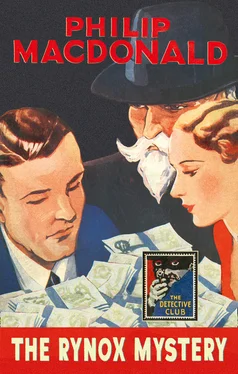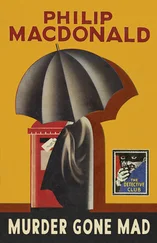COMMENT THE FIRST
NOT a pleasant person, Mr Marsh. Little Ockleton—where he has had a weekending cottage for the past six months—cannot abide him. Nor can any one, it seems, with whom he comes into contact. And how he dislikes having to pay excess postage—or was that outburst more by reason of his feelings towards the sender of that particular letter?
SEQUENCE THE SECOND
Thursday, March 28 th , 193— 12.30 p.m. to 3.30 p.m.
THE offices of RYNOX (Unlimited) are in New Bond Street. A piece of unnecessary information this, since all the world knows it, but it serves to get this Sequence started.
Up the white marble steps of Rynox House—RYNOX themselves use only one floor in the tall, narrow, rather beautiful building—there walked, at 12.30 in the early afternoon of this Thursday, Francis Xavier Benedik—‘F. X.’ to his many friends and few but virulent enemies.
The door-keeper, a thin, embittered person with the name of Butterflute, smiled. The effort seemed—as F. X. had once indeed remarked—to sprain the poor man’s face. But smile he did. Everybody smiled at F. X.—except those few but very bitter enemies. F. X. paused upon the top step.
‘’Morning, Sam,’ he said.
‘Good-morning, sir,’ said Butterflute.
‘How’s the sciatica?’
‘Something chronic, sir.’
‘That’s a bad job. How’s the family?’
‘Not too well, sir,’ said Butterflute. ‘Wife’s confined again; I dunno ’ow she does it! Me boy got three weeks yesterday, for D. and D. in charge of a motor car, and me daughter—well, sir—’
F. X. was grave and sympathetic, also determined. ‘Damned hard luck, Butterflute. Damned hard! Anything you want, just let me know, will you?’
Butterflute touched his cap. ‘Yes, sir. I will that, sir. Thank you, sir.’
F. X. went on and through the main doors and so along the corridor to the lift; a tall, burly but trim, free-striding figure which might have been from the back that of an athletic man of thirty. It was only when you saw his face that you realised that F. X. was a hard-living, hard-working, hard case of fifty-five. You realised that, and you were quite wrong. Wrong about the age, anyhow, for this day was the sixty-seventh birthday of Francis Xavier Benedik. But whatever your guess, whoever you were—unless indeed you were one of those few but very violent enemies—you loved F.X. on sight. He was so very much the man that all the other men who looked at him would have liked to have been. He had obviously so much behind him of all those things of which, to be a man, a man must have had experience.
‘’Morning, sir!’ said Fred. Fred was the liftboy. In direct contrast to Butterflute Fred did not smile. You see, Fred otherwise always smiled, but Fred felt, as every one, that one must do something different for F.X. So instead of smiling, Fred looked grave and important.
‘’Morning, Frederick! Lovely day!’
‘It is that, Mr Benedik, sir. Beautiful day.’
The lift purred softly and swiftly upwards. Frantic would-be passengers on the first, second and third floors were passed with a cool contempt. Had not Fred got RYNOX in his lift!
The lift stopped. For other passengers Fred was wont to jerk the lift, being the possessor of rather a misguided sense of humour, but for F. X. Fred stopped the lift as a lift should be stopped; so smoothly, so gently, so rightly that for an appreciable instant the passenger was not aware of the stopping.
At the gates F. X. paused. He said over his shoulder:
‘You look out for that girl, Frederick.’
From between Fred’s stiffly upstanding cherry-coloured collar and Fred’s black-peaked cherry-coloured cap, Fred’s face shone like a four o’clock winter sun.
‘Beg pardon, sir?’ said Fred. ‘Which girl was you meanin’, sir?’
‘You can’t tell me, Fred! That little dark one; works on the first floor. Between you and me, you might tell her that their Enquiries door wants a coat of paint, will you? … She’s all right, Fred, but you want to look out for that sort with black eyes and gold hair.’
The winter sun took on an even deeper shade.
‘Oh, Fred!’ said F.X.
The lift shot downwards at the maximum of its speed.
Past the big main doors upon this top floor—the big doors with their cunningly blazoned sign:
RYNOX
S. H. RICKFORTH
ANTHONY X. BENEDIK
F. X. BENEDIK
went F. X., with his long, free stride which seemed somehow out of place in a city. Past these and past the next small door bearing the sign:
RYNOX
ENQUIRIES HERE
and so to the modest mahogany door—the door which most people passing along this corridor thought was that of a lavatory. The handle of this door turned in F. X.’s fingers. He went in, shutting the door behind him.
‘’Morning, Miss Pagan. ’Morning, Harris.’ Thus F. X., hanging up his light grey, somehow dashing-looking hat.
‘Good-morning, Mr Benedik,’ said Miss Pagan, her sad, blond beauty illumined by one of her rare smiles.
‘’Morning, sir,’ said Harris.
‘Mr Rickforth in, Miss Pagan?’
‘Yes, Mr Benedik. I think he’s in your room. He said he wanted to see you particularly before you started work.’
‘Mr Anthony here?’
‘Not yet, Mr Benedik. Mr Anthony wired from Liverpool that he was coming in on the twelve-fifty; would you wait lunch for him?’
F. X. crossed the room, stood with his fingers upon the baize door which separated this outer office of his from the corridor leading to the partners’ rooms.
‘Anything else, Miss Pagan?’ he said. ‘I don’t want you to come in with the letters just yet. Wait until I’ve seen Mr Rickforth.’
‘Very well, Mr Benedik.’ Another of Miss Pagan’s rare and sadly beautiful smiles. ‘No, nothing else except Mr Marsh.’
A frown marred the pleasantness of the senior partner’s tanned face. ‘Marsh,’ he said. His voice grated on the ear. ‘Has he been bothering you?’
Miss Pagan shrugged elegant shoulders. ‘Well, not bothering, Mr Benedik, but he’s rung up twice this morning; the second time only five minutes before you got here. He seems to want you very urgently.’
‘Ever know him,’ growled F. X., ‘when he didn’t want to see me very urgently?’
Miss Pagan shook her blond head. ‘I’ve never seen Mr Marsh, Mr Benedik. I must say, though, on the telephone he always does sound cross.’
‘Crosser than his letters?’ said F. X.
‘That,’ said Miss Pagan, ‘would be impossible … Anyhow, he said would you please telephone him as soon as you got here.’
F. X. raised his eyebrows. ‘Number?’ he said.
‘I asked him for the number, Mr Benedik, and he wouldn’t give it.’ Miss Pagan’s eyebrows suggested that Mr Benedik should know by this time what Mr Marsh was like. ‘All he’d say was “the Kensington number”.’
F. X. laughed, a snorting contemptuous laugh. ‘That’s like the fool!’ he said. ‘All right, I’ll get on to him. I’ll see Mr Rickforth now. I’ll ring when I want you, Miss Pagan.’
2
‘But good gracious me!’ said Rickforth. ‘My dear Benedik, I daresay that I have not your push, your ability to handle big things courageously, but I do know, and I think that you know too, that I’m a man with a certain amount of business knowledge, and what I say, Benedik—’
F. X., whose gravity throughout this interview had amounted to more than sadness, suddenly grinned. The whole man, with that flash of white teeth, shed twenty hard-fought years. He said:
‘Sam, my boy, when you clasp your hands over that pot-belly of yours and start calling me Benedik, I can’t help it, but I want to kick your bottom. You know, Sam, the trouble with you is that you’ve got the ability of a Hatry, the tastes of a sexless Nero, and the conscience of an Anabaptist minister. You’re a mess, Sam, an awful mess, but you’re not a bad fellow as long as you don’t hold your belly and call me Benedik, and’—momentarily the smile faded—‘and as long as you don’t try to teach F. X. Benedik his job. Good Lord, man, don’t you think that I know what state the business is in? You seem to forget, as a matter of fact, that I made the damn business. I know how deep we are in it, but I know, too, how high we’re going to soar out of it after this waiting business is over, so for God’s sake stop moaning. If you want to get out, get out! Go for a holiday or something. Go and hold your belly in a cinema. Don’t come here and try to make that fat face of yours all long. I can’t stand it and I won’t!’
Читать дальше












